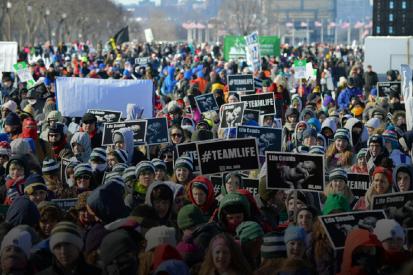Federal Court Should Clarify That March for Life Can’t Be Forced to Pay for Abortions


You probably know the March for Life from its demonstration each January. Hundreds of thousands of pro-lifers gather in Washington, D.C., to march from the U.S. Capitol building to the Supreme Court to rally for the protection of unborn children and their mothers. Maybe you’ve even participated.
What you might not know is that the March for Life Education and Defense Fund is busy all year long with educational and legislative efforts to help protect life.
But, for the past several years, the March for Life has also been kept busy in the courts, standing up for its right to operate according to its convictions. Even with several favorable rulings from the Supreme Court, its legal fight continues.
Let’s take a look at the details of this case.
What is the March for Life Education and Defense Fund?
March for Life was founded in 1973 following the U.S. Supreme Court’s decision in Roe v. Wade, which legalized abortion in all 50 states. Every January since then, March for Life has held a peaceful march to the Supreme Court to mark the decision until Roe is overturned. Hundreds of thousands of pro-lifers attend each year.
March for Life is a pro-life nonprofit organization, and its beliefs are based on morality and science. Of course, it strives to operate consistently with its pro-life beliefs in everything it does. That’s why March for Life does not want to promote abortion through the health insurance coverage it offers to its employees, including emergency abortifacients like Plan B. That would directly contradict and undermine its own mission.
But, for the past several years, March for Life has had to fight for its right to operate according to its pro-life beliefs in court.
March for Life Education and Defense Fund v. California
In 2012, the Obama administration’s Department of Health and Human Services (HHS) mandated that employers provide their employees with abortion-inducing drugs, sterilization, and contraception—regardless of their religious or moral convictions. If they refused, they faced heavy financial penalties under the Affordable Care Act.
A number of religious business owners, including Hobby Lobby and ADF client Conestoga Wood Specialties, challenged the mandate and won at the U.S. Supreme Court in 2014. March for Life also filed a lawsuit against the mandate in 2014 and won in 2015.
In May 2016, the Supreme Court dealt another blow to the mandate in Zubik v. Burwell, which involved five Christian colleges and many other religious groups, including the Little Sisters of the Poor. The Court sent these cases back to the lower courts, asking HHS to come to a resolution that did not burden the religious organizations.
In 2017, the Trump Administration issued new HHS rules, freeing a number of nonprofits with moral or religious objections from the abortion-pill mandate and paving the way for many of the pending lawsuits to finally be resolved (as many have been since).
But it didn’t end there.
That same day, California filed a lawsuit to block these new HHS rules and prevent religious and pro-life nonprofits from receiving this relief. Unfortunately, a district court judge agreed to do so.
March for Life couldn’t sit back and watch these protections be stripped away, so ADF filed a motion to intervene in this case on behalf of the pro-life organization.
Case timeline
- December 2017: ADF attorneys asked a federal court to allow March for Life to help defend the HHS rules that protect pro-life nonprofit organizations from the Obama-era abortion-pill mandate. That request was granted.
- June 2019: ADF attorneys argued on behalf of March for Life at the U.S. Court of Appeals for the Ninth Circuit. ADF urged the Court to reverse a lower court’s order temporarily halting enforcement of the final rules while the case was going on. Unfortunately, the court refused to protect the rights of March for Life and other pro-life organizations that don’t want to be forced to pay for life-ending drugs and devices. So March for Life appealed to the U.S. Supreme Court.
- July 2020: The Supreme Court issued a ruling in two similar cases, The Little Sisters of the Poor Saints Peter and Paul Home v. Commonwealth of Pennsylvania and Trump v. Commonwealth of Pennsylvania. The Court's opinion protects the conscience rights of pro-life and religious organizations. So, the Supreme Court reversed the order halting enforcement of the final rules and sent March for Life’s case back to the Ninth Circuit for reconsideration in light of the Supreme Court's decisions.
- December 2020: ADF attorneys defended March for Life before a federal district court in Oakland.
- Currently: The Court stayed the case while the Biden administration works to roll back protection for religious and moral objectors.
What’s at stake?
Being forced to choose between violating your convictions and facing crippling fines is not a choice at all. The HHS rules created under the Trump administration offer a different and very reasonable path—relief for those who wish to operate and serve their community according to their beliefs. That’s why March for Life is standing up for these rules in court. No pro-life organization should be forced to provide life-destroying drugs and devices against its beliefs and mission.
The bottom line
No one should be forced to pay for or participate in abortion—least of all pro-life groups like March for Life. No matter your views regarding abortion, we should all be able to agree on that.
